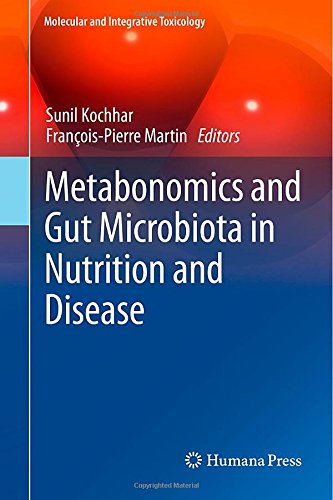Metabonomics and Gut Microbiota in Nutrition and Disease 2014
دانلود کتاب پزشکی متابولومیک و میکروب های روده در تغذیه و بیماری ها
| نویسنده |
François-Pierre Martin, Sunil Kochhar |
|---|
| تعداد صفحهها |
375 |
|---|---|
| نوع فایل |
|
| حجم |
8 Mb |
| سال انتشار |
2014 |
89,000 تومان
این کتاب یک مرور کلی از متابولومیک و تحقیقات میکروبیوتای روده از تجزیه و تحلیل مولکولی تا ملاحظات بهداشت جهانی مبتنی بر جمعیت ارائه می دهد. موضوعات شامل بحث در مورد کاربردها در رابطه با فرآیندهای متابولیک و میکروب های روده در تحقیقات تغذیه، در سلامت و بیماری و بررسی کاربردهای درمانی، تغذیه ای و بالینی آینده است. همچنین ترجمه پذیری رویکردهای زیست شناسی سیستم ها برای تحقیقات بالینی کاربردی و سلامت و تغذیه بیمار را بررسی می کند.
افزایش اختلالات چند عاملی، عدم درک فرآیندهای مولکولی درگیر و نیاز به پیشبینی بیماری در موارد بدون علامت، برخی از سوالات بسیاری هستند که رویکردهای زیستشناسی سیستم به خوبی برای رسیدگی به آنها مناسب هستند. دستیابی به این هدف در توانایی ما برای مدلسازی و درک شبکه پیچیده تعاملات بین ژنها، متابولیسم، عوامل محیطی و میکروبیوتای روده نهفته است. به عنوان متراکم ترین اکوسیستم میکروبی روی زمین، میکروبیوتای روده به عنوان یک جزء اصلی زیست شناسی انسان تکامل یافته است و اساساً تعریف فیزیولوژیکی انسان را گسترش داده است.
پیشرفت های عمده در تحقیقات میکروبیوم نشان داده است که سهم میکروبیوتای روده در وضعیت کلی سلامت میزبان تا به امروز دست کم گرفته شده است. تعامل میکروبی در روده انسان-میزبان یکی از مهمترین ملاحظات بهداشتی انسان امروزی در رابطه با پیشگیری از بیماری توسط حفاظت از محیط زیست با هدف باکتری کشی و همچنین راهبردهایی برای رویکردهای درمانی جدید با استفاده از میکروارگانیسم ها به عنوان هدف و/یا نشانگرهای زیستی است. از بسیاری جهات، انسان بدون اجزای میکروبیولوژیکی مناسب خود یک موجود زنده کاملاً کامل و سالم نیست. به طور فزاینده ای، شواهد علمی میکروبیوتای روده را به عنوان یک رابط بیولوژیکی کلیدی بین ژن های انسان و شرایط محیطی که شامل تغذیه می شود، شناسایی می کند. دیس بیوز باکتریایی یا واریانس در فعالیت متابولیک با تنظیم زدایی متابولیک (مانند چاقی و بیماری التهابی روده) و عامل خطر بیماری (مانند بیماری عروق کرونر قلب) و حتی علل مختلف (مانند اوتیسم و سرطان) مرتبط است، اگرچه نقشی سببی در متابولیسم مختل باید مشخص شود.
علوم متابولیک و میکروبیوم روده در تغذیه و بیماری به عنوان راهنما برای دانشجویان فارغ التحصیل، محققان علوم زیستی یا علوم بهداشتی، و دانشمندان در محیط های دانشگاهی و صنعتی که در زمینه های کاربردی متنوع مانند سلامت، بیماری، تغذیه و تحقیقات میکروبی و پزشکی بالینی انسانی.
This book provides a comprehensive overview of metabonomics and gut microbiota research from molecular analysis to population-based global health considerations. The topics include the discussion of the applications in relation to metabonomics and gut microbiota in nutritional research, in health and disease and a review of future therapeutical, nutraceutical and clinical applications. It also examines the translatability of systems biology approaches into applied clinical research and to patient health and nutrition.
The rise in multifactorial disorders, the lack of understanding of the molecular processes at play and the needs for disease prediction in asymptomatic conditions are some of the many questions that system biology approaches are well suited to address. Achieving this goal lies in our ability to model and understand the complex web of interactions between genetics, metabolism, environmental factors and gut microbiota. Being the most densely populated microbial ecosystem on earth, gut microbiota co-evolved as a key component of human biology, essentially extending the physiological definition of humans.
Major advances in microbiome research have shown that the contribution of the intestinal microbiota to the overall health status of the host has been so far underestimated. Human host gut microbial interaction is one of the most significant human health considerations of the present day with relevance for both prevention of disease via microbiota-oriented environmental protection as well as strategies for new therapeutic approaches using microbiota as targets and/or biomarkers. In many aspects, humans are not a complete and fully healthy organism without their appropriate microbiological components. Increasingly, scientific evidence identifies gut microbiota as a key biological interface between human genetics and environmental conditions encompassing nutrition. Microbiota dysbiosis or variation in metabolic activity has been associated with metabolic deregulation (e.g. obesity, inflammatory bowel disease), disease risk factor (e.g. coronary heart disease) and even the aetiology of various pathologies (e.g. autism, cancer), although causal role into impaired metabolism still needs to be established.
Metabonomics and Gut Microbiota in Nutrition and Disease serves as a handbook for postgraduate students, researchers in life sciences or health sciences, scientists in academic and industrial environments working in application areas as diverse as health, disease, nutrition, microbial research and human clinical medicine.




